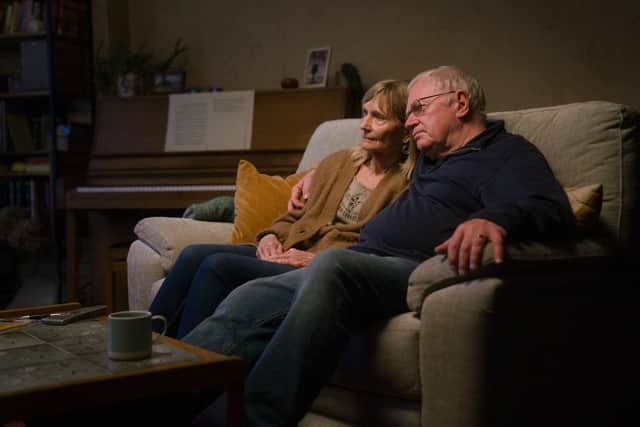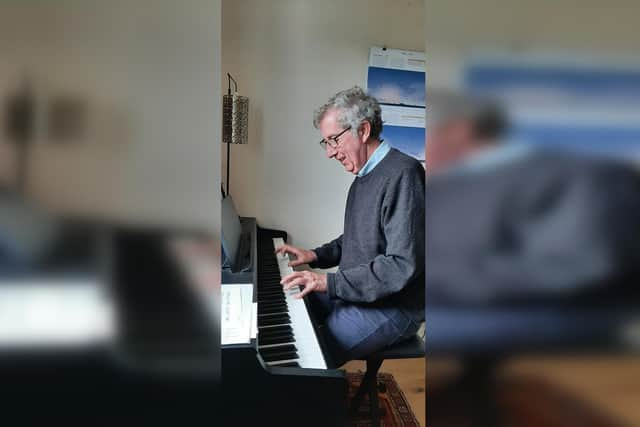'Dementia isn’t a lifestyle choice' says wife of Scarborough man diagnosed with the disease at just 60


The couple have been speaking during Dementia Action Week (May 16-22) as new figures show almost one in four people with dementia in Yorkshire and Humber battle symptoms for over two years before getting a diagnosis.
Steven Peacock, 65, of Scarborough, was just 60 when he was diagnosed with frontotemporal dementia in 2018. It came as a huge shock to him and wife Brigit, who admitted: “Our initial reaction was one of disbelief.
Advertisement
Hide AdAdvertisement
Hide Ad“We were completely ignorant about dementia. As far as we were concerned, it was something that happened to older people, and we didn’t think of ourselves as old at all.”


However, with hindsight, they say the signs were there. Steven recalled how he had failed to recognise a close friend he’d known for 30 years when he called to the couple’s house to give him a DVD, and on another occasion he remarked how a woman on a train looked ‘just like our daughter Emily’ when, in fact, it was Emily.
She had been travelling with them and other family members and had only been out of sight for a short time to use the toilet.
Brigit added: “From first suspecting something wasn’t quite right, it was probably about a year before we saw a GP. Steven was referred to a memory clinic but they just put his symptoms down to stress, which was not helpful at all.
Advertisement
Hide AdAdvertisement
Hide Ad“Thankfully, the GP disagreed with this assessment and Steven was finally given a diagnosis after visiting the neurology department in York. We were totally devastated. Like everyone else, we had plans for the future – we’d been looking at possibly buying a house in Ireland, but none of that was practical anymore.


“At first I just kept asking, ‘why us?’ but then I thought ‘why not us?’ Dementia isn’t a lifestyle choice, but we did eventually come to accept it, and realise that we should stop thinking about what we can’t do and focus on what we can do.”
For Steven, that has included taking up the piano. He had never played an instrument before his devastating diagnosis. But in the past year, in an effort to keep his brain active, he has not only leaned to play the piano, he has recorded an album of his own compositions, called Leaves Falling on the Moon, which he has released on Spotify.
A new Alzheimer’s Society survey found almost one in four (23%1) people with dementia in Yorkshire and Humber lived with the condition more than two years after first noticing symptoms, before getting a diagnosis, confusing symptoms with old age is main reason for delay.
Advertisement
Hide AdAdvertisement
Hide AdThe survey of more than 1,000 people with dementia and carers, released today to mark the start of Dementia Action Week (May 16-22), also showed more than one in three (36%) respondents in the area waited between one and two years.
The main reason for delay according to 68% of respondents in Yorkshire and Humber, and 42% nationally, was that they assumed the symptoms were just part of getting old, preventing them from accessing treatment, care and support sooner.
Dementia describes a group of symptoms that include problems with memory, thinking or language, and changes in mood, emotions, perception and behaviour. Dementia is caused by diseases of the brain and is not a natural part of ageing.
In a bid to tackle the problem, Alzheimer’s Society has today launched a new campaign – ‘It’s not called getting old, it’s called getting ill’ – to encourage people worried about their own or their loved ones’ memory to seek support in getting a diagnosis.
Advertisement
Hide AdAdvertisement
Hide AdThe charity has worked closely with leading clinicians to make the diagnosis process easier, developing a new ‘symptoms checklist’, available on their new online hub, highlighting changes that might be due to dementia.
In an emotional film released on Monday May 16, the charity shows how the symptoms of dementia, such as asking the same question repeatedly, can easily be dismissed as a sign of old age.
Judith King, Head of Services for Alzheimer’s Society, said: “Asking the same question over and over again is not called getting old, it’s called getting ill. If you’re worried for yourself or someone you love, take the first step this Dementia Action Week – come to Alzheimer’s Society for support.
“The stark findings of our survey released today show just how dangerous it can be to battle dementia symptoms alone and put off getting help.
Advertisement
Hide AdAdvertisement
Hide Ad“Yes, getting a diagnosis can be daunting, but it is worth it. More than nine in 10 people with dementia told us they benefited from getting a diagnosis – it gave them crucial access to treatment, care and support, and precious time to plan for the future.
“With the pandemic causing diagnosis rates to plunge, it’s more important than ever to seek help. You don’t have to face dementia alone, we’re here to support everyone affected.”
Alzheimer’s Society’s survey also revealed almost a third (32%) of those in Yorkshire and Humber who were diagnosed after two years only sought a diagnosis because they had reached a crisis point – with the vast majority saying they were struggling to look after themselves.
There are 900,000 people living with dementia in the UK, including an estimated 76,130 across Yorkshire and Humber.
Advertisement
Hide AdAdvertisement
Hide AdMore than 200,000 people will develop dementia this year, the equivalent of one person every three minutes. But with diagnosis rates at a five-year low, tens of thousands of people are now living with undiagnosed dementia without access to the vital care and support that a diagnosis can bring.
Alzheimer’s Society conducted a separate public poll which found a lack of knowledge about dementia symptoms and fear, are also significant barriers to seeking help, with 17% in Yorkshire and Humber admitting they would not recognise the symptoms of dementia, and 15% in the area saying they would not go to the GP for a diagnosis because they were scared.
Family and friends play a big role in helping people recognise the onset of dementia symptoms, but worryingly 47% in Yorkshire and Humber confessed they would feel uncomfortable raising concerns with a loved one if they were showing symptoms.
Dr Jill Rasmussen, the Clinical Representative for Dementia at the Royal College of General Practitioners, said: “It’s vital for patients, their families and GPs that conversations with the potential for a diagnosis of dementia are timely and effective.
Advertisement
Hide AdAdvertisement
Hide Ad"The new checklist developed with Alzheimer’s Society is a simple, free tool to help patients and their families clearly communicate their symptoms and concerns during an often time-pressured appointment.
"This resource could make a real difference in identifying those people who require referral for a more detailed evaluation and diagnosis of their problems. We’re asking anyone who is worried about possible dementia symptoms to use the checklist and share it with their primary care team”.
This Dementia Action Week, Alzheimer’s Society is urging anyone worried about themselves or someone they love to take the first step and contact the charity for support. Support and more information about a diagnosis is just a phone call or a click away.
Visit alzheimers.org.uk/memoryloss or call 0333 150 3456. For callers who do not have English as their language of choice, Alzheimer’s Society can arrange a simultaneous language translation service.